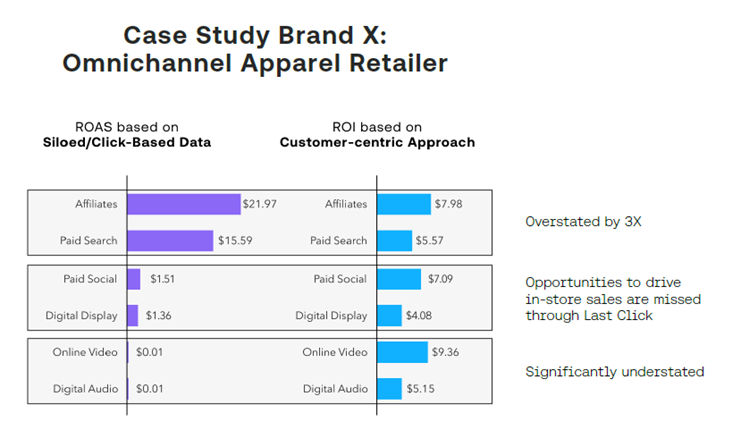In the first instalment of WARC's Marketing Truths series Ann Marie Kerwin, Americas editor at WARC, and Mike Menkes, SVP at Analytics Partners, look at why effectiveness is as important as efficiency when it comes to marketing investment.
Podcast episode
Marketing Truth #1: Effectiveness is as important as efficiency
with Analytic Partners SVP Mike Menkes
Welcome to 2024! A new year always brings fresh optimism, the chance to reevaluate old habits and the opportunity to (re)focus on the fundamentals.
It’s never a bad time, of course, for marketers to remind themselves of best practices and learn how industry leaders are applying them. But that will be especially valuable in preparing for what is shaping up to be a very challenging 12 months – from ongoing economic and political stress to continued disruption in the media ecosystem, not least due to the rise of AI.
In helping the industry navigate this difficult environment, WARC is introducing a new podcast series that focuses on “Marketing Truths” – that is, the proven foundations of long-term success for brands. Over the course of five episodes, we will examine the keys to marketing impact which have stood the test of time (and been shown to work during periods of fiscal uncertainty).
Here’s the good news: marketing works.
How do we know?
Here at WARC, we know because we have three decades of sorting through research, case studies, and data to determine how the most effective marketers succeed. We’ve looked at the strategies, tactics, and channels that work, how spending is budgeted and assigned, and the creative that changes behavior.
That isn’t to say there aren’t new challenges, new problems, new avenues to explore. It helps to meet those challenges with the understanding of what has worked for the most successful marketers, those whose work has had a tangible impact on moving the goals of their business forward, whether that is delivering more customers, more sales or more revenue. Effectiveness is how marketing achieves those goals. The components of effectiveness are what we are going to explore in this new 2024 series, Marketing Truths.
These paths to marketing success have previously been laid out in WARC’s Anatomy of Effectiveness report. In our new podcast series, we’ll be interviewing industry practitioners to demonstrate the ways these Marketing Truths are being used successfully by US marketers.
WARC’s Marketing Truths Series:
- Jan 25 Marketing Truth #1: Effectiveness is as important as efficiency
- Feb 29 Marketing Truth #2: Strong brands have an effectiveness advantage
- Mar 28 Marketing Truth #3: Creativity supercharges marketing's impact
- April 25 Marketing Truth #4: Maximize reach to achieve the greatest impact
- May 30 Marketing Truth #5: Building brands is much bigger than advertising
Each month, we’ll have a new interview, and point you to relevant reports, case studies and articles on WARC that will help to make the case at your organization for these Marketing Truths.
Effectiveness is as important as efficiency
This first episode dives into why it is imperative that CMOs help their organizations understand why effectiveness is as important as efficiency when it comes to marketing investment. Marketers can get caught in a trap of chasing efficiency at the expense of effectiveness. There are times when it is more effective to walk rather than fly, that is, to take the time to build a brand message rather than expend all your energy on the immediate short-term result.
As our first guest, Mike Menkes, SVP of Analytic Partners, says, it’s time for marketers and their finance partners to move past a world where the debate centers around which half of the marketing budget works and which doesn’t work. Marketing works. It’s just a matter of making sure the organization is tracking how it is working and adjusting spending decisions so marketing is as effective as it can be.
What you don’t want to do is look at a set of metrics that don’t allow measurement of the full impact of the entirety of marketing efforts. For example, performance marketing metrics, such as return on advertising spend (ROAS), only show a portion of the customer’s journey and often omit big swaths of media data or focus only on a particular walled garden partner.
Analytic Partners demonstrates how ROAS results can differ greatly from ROI measurement which considers all factors that influence consumer decision-making, and how it can lead to the wrong decisions, as illustrated by a case study involving an apparel retailer. Here this marketer, if it had only focused on ROAS, would have missed out on an opportunity to drive in-store sales and greatly underestimated the contributions of online video and digital audio.

Source: Analytic Partners
To capture the impact of all marketing activity, metrics need to reflect how marketing truly works, how advertising today will influence purchases over the next several weeks and beyond, how advertising one product can lead to a halo effect that boosts other products in your portfolio and differences between upper and lower funnel executions. Tracking the effectiveness of all of your marketing means you’ll be able to make a clear decision about when cost efficiency isn’t worth it.
Want to dive deeper?
Analytic Partners Mike Menkes explains how focusing on efficiency can backfire if marketers don’t take in the full picture.
Anatomy of Effectiveness report: How do I prioritize effectiveness over efficiency?
Anatomy of Effectiveness report: Do we need to rethink brand vs. performance?
Article: It's time to talk about marketing effectiveness
Case study: adidas makes course correction on marketing effectiveness

